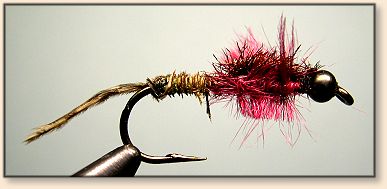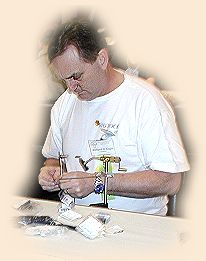|
I went out for another of my Saturday morning
recuperation periods. I got to the pond and it
was dead still. I could see rises all over the
place and thought that I would have some top
water fun.
Got the canoe off the truck and all my stuff into
it. Just as I launched the canoe the breeze started
up. The breeze put a ripple all the way across the
pond and effectively shut down the rises.
This was no problem as I figured that the fish would
still be biting. They might be just under the surface
or might have dropped down deeper. In any case I had
three rods with me so I could switch flies by just
changing rods.
After the first hour I had caught four fish. I had
used fifteen different patterns. I was not having
any luck at any depth with any retrieve. It was
time to start doing thing much differently.
I tied on some smaller flies on two rods and put a
beadhead woolly bugger on the other to get really deep.
I did catch a few more fish but it was still very slow
and there was no pattern to where the fish were and
what they were taking.
At the end of two hours I had twenty fish to my credit.
It was time to try all the weird things that I had
tied to see if they would work. The first thing that
I tied on was a PTN variation. I use ring neck pheasant
tail fibers for the tail. I pinch part of the end of
the fibers off so they are stiffer for the tail. I use
a tail feather fiber from the ring neck, American and
Reeves pheasant for the body. I coat the thread with
Sally Hansons "Hard as Nails", then twist the fibers
together and wrap them up the body. The wing case is
red and green peacock herl. The thorax is red ostrich
herl. I did use a small black bead head on this fly.

I cast this fly and was going to let it drop but the
line tightened and I had a fish on. Turned out to be
a nice bluegill. I cast again and the fly had just
started to drop when I saw the line move. I set the
hook and had another gill on the line. I cast back
to the same place and nothing happened, even as I
retrieved the fly. I cast about ten feet to the side
and had another hit. This one felt different and so
I was a little more gentle bringing it in. This time
I had a crappie that was just barely hooked. I just
managed to net it before the hook tore loose.
I cast around the canoe some more and did not get
any more bites. It finally hit me that the fish were
all out over deeper water and seemed to be scattered.
I paddled to the end of the pond to let the breeze
low me across the pond. I started casting and
immediately had fish hit. I caught several more gills.
I had several crappie hit but the hook would tear
out before I got them in even when I tried to be
gentle. I finally hit an area were I was getting
a hit on every cast. I dropped the anchor to stay
in that spot. I made short cast and had fish hit
the fly just after it went under the surface. I cast
around the canoe and then repeated this with about
another three feet of line.
I found that if a gill did not hit the fly as it
dropped under the surface, I would start to retrieve
the fly with a long strip and then pause. The crappie
it would hit it on the pause. This was the only retrieve
I found that worked. Of course, I stopped when I found
what was working.
I was still catching fish when my time ran out. I
had promised to wash dishes at a funeral dinner and
needed to get home so I would have time to clean the
fish and the fisherman. It was hard to leave when
the fish were biting that well.
Got home and my wife informed me that we were needed
to help set thing up also for the dinner. The people
who were supposed to do this had not done it. I told
her that I would need her to help with the fish and
we could be ready sooner. I had her take the filets
off the skin and I did the rest.
We did 72 fish in 35 minutes with only three nicks
on my fingers. My wife said that she was not wild
about doing this.
We did get cleaned up and got everything set up.
Hope you can get out on the water. ~ Rick
ziegeria@grm.net
|





